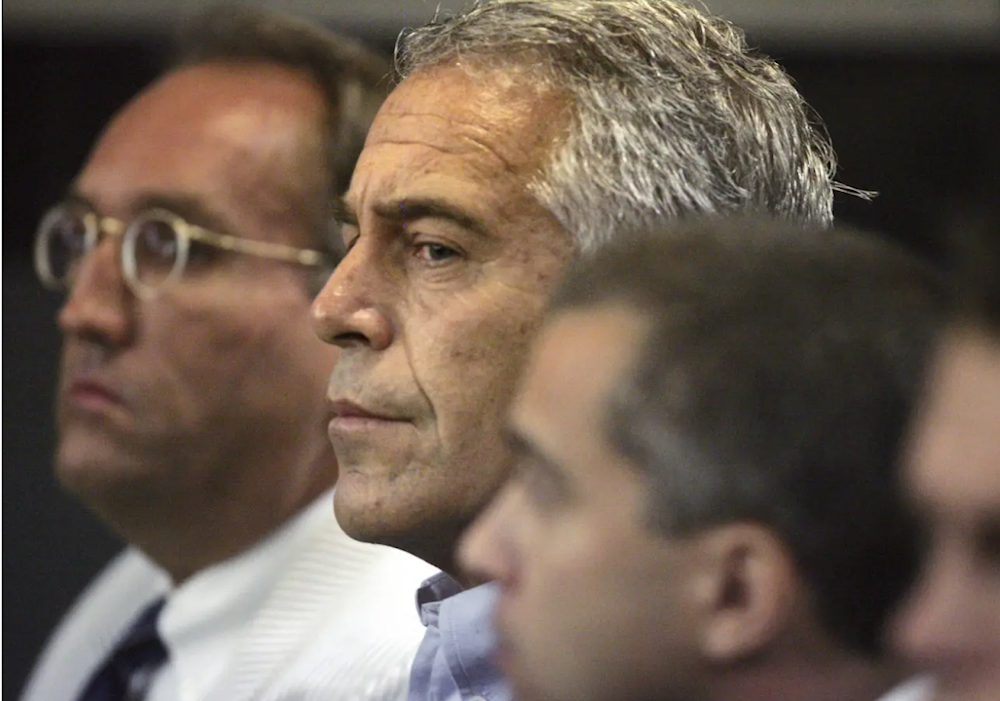Epstein scandal expands with release of letters from public figures
The New York Times reveals letters from Ehud Barak, Woody Allen, and others written to Jeffrey Epstein for his 63rd birthday.
-

Jeffrey Epstein appears in court in West Palm Beach, Florida, on July 30, 2008 (AP)
The long-running Jeffrey Epstein scandal deepened this week as The New York Times published a previously unseen trove of letters and photographs linked to the disgraced financier. The letters, written by prominent figures such as former Israeli Prime Minister Ehud Barak and filmmaker Woody Allen, were reportedly compiled as a gift for Epstein’s 63rd birthday in 2016.
The release of the documents comes amid renewed scrutiny over Epstein’s ties to powerful individuals, including former President Donald Trump. Epstein, who died in jail in 2019 while awaiting trial on sex trafficking charges, maintained close relationships with elites across politics, entertainment, and academia.
In one letter, Barak and his wife praised Epstein’s intellect, calling him “a collector of people” and someone who “knows everything about everyone.” They expressed wishes for his continued health and friendship.
Woody Allen, in his note, fondly recalled Epstein’s exclusive dinner parties, describing the guest lists as a mix of “politicians, scientists, teachers, magicians, comedians, intellectuals, journalists," and “even royalty”. He added a darkly odd remark about the hosts, comparing the scene to “Castle Dracula", with “three young female vampires who service the place.”
The revelations shed further light on the depth of Epstein’s connections and the troubling normalization of his social status within elite circles.
Disturbing glimpse inside Epstein’s inner circle
The letters, written as a 63rd birthday tribute in 2016, came from well-known individuals, including billionaire media mogul Mortimer Zuckerman, MIT Media Lab’s former head Joichi Ito, linguist Noam Chomsky and his wife, physicist Lawrence Krauss, and Harvard biologist Martin Nowak.
While Allen, Ito, Zuckerman, and Nowak did not respond to requests for comment, Barak declined, and Chomsky’s wife replied on his behalf, also declining. Krauss told the NYT he didn’t recall the letter but remembered attending “several lunches with very interesting discussions” at Epstein’s residence.
Alongside the letters, NYT published disturbing photographs from Epstein’s seven-story New York mansion. Among the items displayed: a taxidermied tiger, surveillance cameras in the bedroom, and a green first-edition copy of Lolita, prominently showcased in his office. The novel, infamous for its depiction of child sexual abuse, appears to reflect Epstein’s disturbing interests.
The so-called “massage room", where many underage survivors say assaults occurred, contained paintings of naked women, shelves of lubricant, and a large silver ball and chain.
The publication adds another layer to the ongoing scrutiny of Epstein’s elite connections and the disturbing extent of his social and political reach.
Trump connection and political fallout
The NYT report on Jeffrey Epstein’s Manhattan mansion revealed further disturbing details, including bizarre decor such as framed prosthetic eyeballs in the entryway and a sculpture of a woman in a bridal gown hanging from the atrium ceiling. A chalkboard map of "Israel", signed by Barak, was also reportedly displayed in the home.
Epstein died by suicide in federal custody in 2019 while awaiting trial on sex-trafficking charges. His ties to influential figures have sparked public interest in the case, particularly after the Trump administration fell short on its promises to disclose information about the case. The reversal sparked bipartisan backlash, including from Trump supporters and conservative media.
About a week later, WSJ reported that Justice Department officials had informed Donald Trump earlier this year that his name appears in the Epstein files. The report emphasized that being named in the records does not imply wrongdoing. A spokesperson for Trump dismissed the claim as “fake news".
Amid increasing public pressure, the Justice Department dispatched Deputy Attorney General Todd Blanche, who previously served as Trump’s lawyer, to meet with Ghislaine Maxwell in late July. The goal was to determine whether Maxwell had information on others who may have committed crimes against Epstein’s victims.
The closed-door meeting reportedly spanned two days. Shortly afterward, Maxwell was quietly transferred from her Florida prison to a lower-security facility in Texas.

 4 Min Read
4 Min Read










